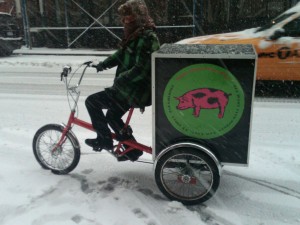Few food lovers have accomplished so much so early in their career (check out her feature in NY Magazine), and even fewer can flaunt the coveted title of forager. Originally coined by Chez Panisse in Berkeley back in the 1970's, foragers are an essential employee to restaurants, acting as interpreter between the chefs and the farmers and making the most of the ever-changing seasonality and the bounty that it brings.
We post this toward the end of Annie's tenure. (Act fast and you may be able to snatch up her spot at The Pig!) Join us in wishing Annie well during her summer stint at Eckerton Hill Farm.
What attracted you to a good food job?
During a year off after graduating high school, I worked on a small farm in Umbria, Italy through the organization
WWOOF. My initial intention was to be learning and speaking Italian, and farming was an affordable way to live in Italy, have work, and become part of a community there. After three months on the farm, harvesting grapes and olives, I came back to New York, and waitressed and went to school, and got myself in touch with
Just Food so I might volunteer in a few gardens. I don't think I realized how much I'd missed the soil until I was spending my free time weeding in gardens in New York City. But I've been pretty helplessly attracted to all aspects of food and agriculture since then, when I began to meet the community of people in New York who are working (and have been for decades) to save and strengthen a local food system here. Markets, gardens, potlucks, small shops, urban farms, rural farms, homes, and every other place where food is a focus seemed to offer a life with an irresistible combination of hard work, practical creativity, and joy. I wanted (and want) a life with that in it.
As for working as a cook, I haven't ever wanted to do it, though I very much respect the women and men who work in restaurant kitchens. I like to be free with my cooking, to use whatever I have in the house, to ignore recipes, to resist direction. I'm too used to being my own boss when it comes to the kitchen.
How did your previous work or life experience prepare you for a good food job?
Throughout college, I volunteered, interned, worked part-time, or somehow was almost always participating in food-related enterprises and events. I didn't have much experience going into any of it, but once you've worked one place, especially in Brooklyn, everybody knows everybody. Once you've shown that you're reliable and passionate, it's not hard to find friends of friends of friends of your first boss who need help selling at a market, working at their shop on Sundays, pickling on Tuesday evenings, distributing flyers or emailing announcements, labeling jars, harvesting green beans on Saturday mornings, building greenhouses, constructing rainwater catchment systems, helping to plan conferences. There was always something to learn. I worked with
Just Food,
Added Value,
Saxelby Cheesemongers,
McClure's Pickles, the
Real Food Challenge,
Hot Bread Kitchen,
BrightFarm Systems,
Radishes and Rubbish,
New Amsterdam Market. By the time I graduated from
NYU, I was writing regularly for my own website, leading students on field trips to food production sites, and had completed research reports on Urban Agriculture as well as Farm-to-Institution connections. I could go on. Everything feels like experience and preparation.
What advice do you have for others in search of a good food job?
No work is too small. Paste labels on jars, wrap cheese, stock shelves, and you will learn something. Start small, learn from others' knowledge, and make friends.
Also, I hope people looking to work in food will recognize and keep a big picture in mind. There are a lot of trends in food right now, especially in New York, that use all the right words. They are artisanal, green, charming, small scale, morally appealing. But, even collectively, no efforts will make a difference in the food system if they are not made with the idea of an intentional part in that change. Work with an eye always on who you are serving, what community you are affecting, where the money you handle is going, and where it comes from. There is not a right answer to these questions, but there should always be an answer you'll stand by.
If you could be compensated for your work with something other than money, what would it be?
Land, not too far from New York City. And unlimited USA Rail Passes.









